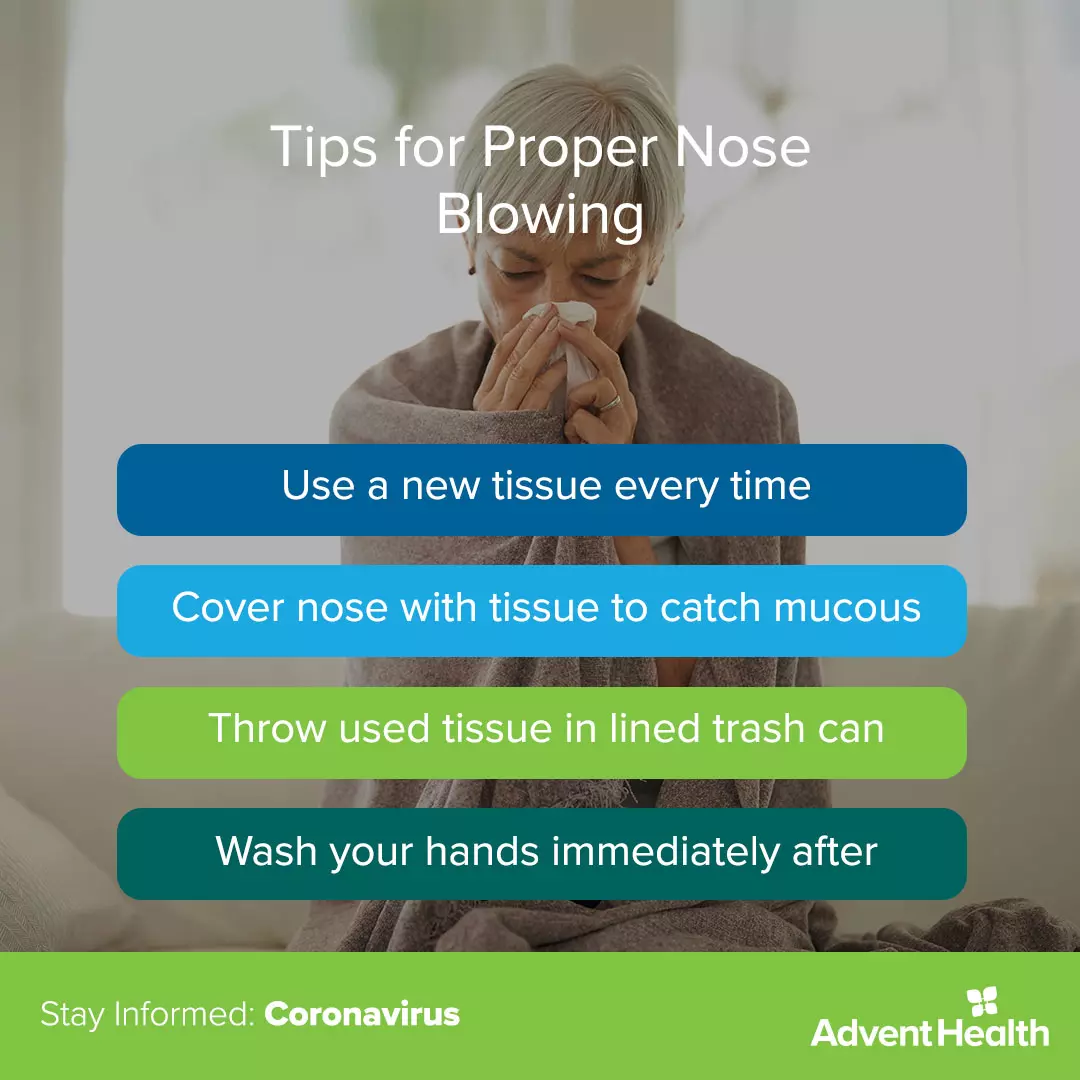- AdventHealth

Coronavirus (COVID-19) is an infectious disease that spreads through respiratory droplets. The latest research from the Centers for Disease Control and Prevention (CDC) and the National Institutes of Health (NIH) found that the virus can live in airborne droplets for hours and on hard surfaces for several hours and up to three days on some materials.
It’s more important than ever to remind your family not to touch their nose, mouth or eyes, and to wash their hands immediately after blowing their noses — because that’s how this virus enters your body. Here are some essential tips to help keep your family safe from spreading coronavirus germs.

How COVID-19 Spreads
Coronavirus can spread between people who are in close contact with one another, within about six feet, according to the CDC. The virus travels through respiratory droplets when an infected person coughs or sneezes. Someone who is well can become sick if they inhale contaminated droplets from a sick person.
Coronavirus can also spread to other people who touch respiratory droplets that are left behind on hard surfaces, like countertops, bathroom fixtures and doorknobs. A person who is well can become sick if they touch contaminated surfaces and then touch their nose, mouth or eyes.
A new study by the NIH and the CDC found that the novel coronavirus can live up to three hours in airborne droplets. The virus can also live for a long time on these different surfaces: up to four hours on copper, up to 24 hours on cardboard and up to two to three days on plastic and stainless steel.
The symptoms of coronavirus infection, including fever, cough and shortness of breath that appear two to 14 days after exposure, are similar in children and adults. However, symptoms in children may also include a runny nose, according to the CDC.
To help reduce the spread of coronavirus, experts recommend avoiding touching your nose, mouth and eyes with bare hands. If you need to touch these areas, do it with a clean tissue or wash your hands first, the World Health Organization advises.
The Right Way to Blow Your Nose
The CDC offers the following tips for your family on how to blow their noses properly:
- Use a new tissue every time you blow your nose
- Cover your nose with the tissue to catch any mucous
- Throw the used tissue in a lined trash can
- Wash your hands immediately after blowing your nose
Wash Your Hands After Blowing Your Nose
Washing your hands after blowing your nose, coughing or sneezing is one of the best ways to remove germs and prevent the spread of germs to others, says the CDC.
Follow these five steps every time you wash hands with soap and water:
- Wet your hands with running water, turn off the tap and apply soap.
- Lather your hands by rubbing them with the soap. Make sure to lather the back of your hands, between your fingers and under your fingernails.
- Scrub your hands for at least 20 seconds. Time 20 seconds by humming the “Happy Birthday” song twice. For little ones, make this part fun by substituting a favorite song, poem or nursery rhyme that lasts at least 20 seconds.
- Rinse your hands well with clean, running water.
- Dry your hands using a clean towel or let them air dry.
If soap and water are not available, clean your hands with a hand sanitizer that contains at least 60% alcohol. Here’s how to use hand sanitizer properly, according to the CDC:
- Read the label to learn the correct amount of gel to use
- Apply the gel to the palm of one hand
- Rub hands together
- Rub the gel on your hands and fingers until your hands are dry
- This should take about 20 seconds
Your little ones may not be able to blow their own nose. They may also not remember to avoid touching a runny nose and their toys or other surfaces in your home. After you help them blow their nose or clear excess mucous, remember to wash your hands — and theirs.
Cleaning Other Surfaces
Help prevent family members from becoming sick by cleaning and disinfecting surfaces in your home that are touched on a daily basis. If the surfaces are dirty, clean them first with a detergent or soap and water before disinfecting them, says the CDC.
Follow instructions on disinfectant cleaners recommended as effective against the coronavirus by the EPA. You can also disinfect surfaces by using a diluted household bleach solution with proper ventilation and by following the manufacturer’s instructions for application.
With common sense and insisting that everyone in your family follows good hygiene for nose blowing, you can help keep your family safe from the spread of coronavirus.
Learn More
If you need more advice on keeping your family safe during coronavirus outbreak, visit our Coronavirus Resource Hub for more information and answers to your coronavirus FAQs. You can use The AdventHealth App to access your medical records, message your care team or be seen by a physician through a virtual visit in the comfort of your own home.


